GLOBAL GROWTH BUSINESS STRATEGY - INTERNAL EPISODE | E050 PODCAST
LISTEN TO THIS EPISODE
ABOUT THE EPISODE
George Stroumboulis sits down with Chris Hartswick, co-founder of Ideoli Group, on the Invigorate Your Business Podcast, recording from Athens, Greece, to discuss their journey of global business expansion. With Ideoli products now installed in over 30 countries, George and Chris share insights from recent high-level meetings with influential partners, the challenges of navigating international markets, and the strategies they’ve developed to adapt and thrive.
They dive into the intricacies of Ideoli’s recent acquisition, revealing the unexpected hurdles and valuable lessons learned along the way. This acquisition has expanded their operational reach, improving service for clients worldwide and reinforcing Ideoli’s commitment to growth. In just two days on the ground in Athens, they hosted a networking event in Kolonaki with over 20 friends, partners, clients, and employees, connecting with their international network and celebrating their shared vision. This episode is packed with essential advice for entrepreneurs aiming to grow globally and manage the complexities of acquisitions.
Ideoli’s Website
Ideoli’s Instagram
Ideoli’s LinkedIn
Ideoli’s Twitter
George Stroumboulis sits down with Chris Hartswick in Athens, Greece on the Invigorate Your Business Podcast to talk about all things related to their company, major meetings with global players, navigating international influencers, global expansion, challenges and so much more.
“Our whole supply chain is global from the manufacturing, from the logistics, from the freight, from our clients, our products are in over 30 countries around the world, which, by default, we’re inviting just issues to happen with what’s going on.”
MEDIA RELATED TO THE EPISODE
In this episode of Invigorate Your Business, George Stroumboulis catches up with Chris Hartswick in Athens, Greece, where they discuss their company’s journey, impactful meetings with global players, navigating the world of international business, expansion challenges, and more.
George Stroumboulis and Chris Hartswick sit down in Athens on the Invigorate Your Business Podcast to dive into a discussion about their company, recent high-level meetings with influential figures, the complexities of global expansion, and the unique challenges of international business.
On this episode of Invigorate Your Business, George Stroumboulis and Chris Hartswick chat from Athens, Greece, unpacking insights about their company’s growth, key global partnerships, tackling international markets, and the hurdles faced in expanding their global footprint.
Live from Athens, Greece, George Stroumboulis and Chris Hartswick engage in a dynamic conversation on the Invigorate Your Business Podcast, covering everything from their company’s growth strategy and global meetings to international expansion and the challenges they’ve encountered.
George Stroumboulis hosts Chris Hartswick in Athens on the Invigorate Your Business Podcast to explore the intricacies of their business, recent major meetings on the global stage, navigating new markets, and the challenges of growing internationally.
George Stroumboulis sits down with Chris Hartswick in Athens, Greece on the Invigorate Your Business Podcast to talk about all things related to their company, major meetings with global players, navigating international influencers, global expansion, challenges and so much more.
ABOUT THE “INVIGORATE YOUR BUSINESS” PODCAST
The Invigorate Your Business with George Stroumboulis podcast features casual conversations and personal interviews with business leaders in their respective fields of expertise. Crossing several industry types and personal backgrounds, George sits down with inspiring people to discuss their business, how they got into that business, their path to the top of their game and the trials and tribulations experienced along the way. We want you to get inspired, motivated, and then apply any advice to your personal and professional lives. If there is at least one piece of advice that resonates with you after listening, then this podcast is a success. New episodes weekly. Stream our show on Spotify, YouTube, Apple, Amazon and all other platforms.
ABOUT GEORGE STROUMBOULIS
George Stroumboulis is an entrepreneur to the core, having launched several ventures across multiple industries and international markets. He has held senior-level positions at progressive companies and government institutions, both domestically and internationally, building an extensive portfolio of business know-how over the years and driving profit-generating results. George’s ability to drive real change has landed him in several media outlets, including the front page of the Wall Street Journal. George was born in Toronto, Canada to his Greek immigrant parents. Family first. Flying over 300,000 miles a year around the world puts into perspective how important family is to George’s mental and emotional development. With all this travel to global destinations, the longest he stays even in the most far-out destination is 3 days or less - a personal rule he lives by to make sure he is present and involved in family life with his wife and three daughters. To read about George’s global travels, stay connected with his blog section.
STAY CONNECTED WITH GEORGE STROUMBOULIS
STREAM & LISTEN TO THE PODCAST:
SPOTIFY: https://open.spotify.com/show/1rW2CmxQoiJNEPOZupJlvd
YOUTUBE: https://www.youtube.com/user/Stroumboulis
APPLE iTUNES: https://podcasts.apple.com/us/podcast/invigorate-your-business-with-george-stroumboulis/id1607693240
AMAZON MUSIC: https://music.amazon.com/podcasts/8fc03929-71b3-483a-a64e-153e30b3d462/invigorate-your-business-with-george-stroumboulis
STROUMBOULIS SITE: https://www.stroumboulis.com/podcast
PODCAST SITE: http://www.invigorateyourbusiness.com
FOLLOW GEORGE STROUMBOULIS:
INSTAGRAM: https://www.instagram.com/georgestroumboulis/
YOUTUBE: https://www.youtube.com/user/Stroumboulis
LINKEDIN: https://www.linkedin.com/in/Stroumboulis/
TWITTER: https://twitter.com/Stroumboulis
FACEBOOK: https://www.facebook.com/georgestroumboulis
TIKTOK: https://www.tiktok.com/@georgestroumboulis
CONTACT GEORGE DIRECTLY: https://www.stroumboulis.com/connect
FULL SHOW TRANSCRIPT
George Stroumboulis: 0:00
Welcome to another episode of Invigorate your Business with George Stroumboulis. Today's episode comes from Athens, Greece. I'm here with my business partner, Chris Hartswick, and we're doing a lot of different things. We have brand new potential client meetings, we're meeting with existing partners, we're filming podcasts, we're visiting job sites, we're hosting networking events, we're team building with our employees here in Athens and we're covering so many different things. We're really excited to be expanding our business over here. We're going to start talking more about what we're doing internationally, how we're cultivating global clients and just some of the ups and downs of being able to do this and advice for the listeners at home. So enjoy this episode starting now. My name is George Stroumboulis and I'm extremely passionate about traveling the world, meeting new people and learning about new businesses. Join me as I sit down with other entrepreneurs to learn about their journeys.
George Stroumboulis: 1:16
This episode of Invigorate your Business starts now here in Athens, Greece. Got in here yesterday, leave basically in the middle of the night today, tonight, tomorrow, and it's exciting. This is the 50th episode, right?
Chris Hartswick: 1:31
Yes.
George Stroumboulis: 1:32
Like that's kind of crazy over the last two years. First episode with you was two years ago, talking about your career path and how we got into this. That was two years ago.
Chris Hartswick: 1:41
Crazy.
George Stroumboulis: 1:42
Yeah, and look what we've been doing over you know, scattered with a bunch of different interviews of just random business people, learning from them. We've always, every few episodes, got together and started talking about trials, issues building a business, things we're learning, things we're screwing up. That's kind of been our progression over the years and we've always touched upon international business. So I think it's fitting 50th episode. We're in Athens, greece, here for some serious major meetings in a day and a half crammed in. We're going to focus on international business on this episode and obviously specific to us. So talk to me just about Athens in general. We're here, we have a big. By the way, this is going to be a very short, 20, 25 minute, sure, because we're hosting a cocktail dinner tonight with various friends, some family, clients, partners, employees, just bringing everyone together for a few hours. Yeah, get drunk, get on a plane and go home Perfect, yeah. So talk to me, chris. How is Athens and what does it mean?
Chris Hartswick: 2:40
It's good man it's. You know it's interesting now even you know it's funny. You said two years ago but it's almost basically a year and a half-ish ago was when we fully established officially in Greece, right Registered, opened, the office got set up with the government, all the nitty gritty that we had to do, and it was one of those things like we both believed in at the time, or else obviously we wouldn't have done it. But it's still. When you're going through it, it's kind of hard to truly see that future right. It's kind of hard to sit there and be like, okay, I believe in this, but you always kind of have that is it going to work right, like we're taking a chance and you got to be willing to take that chance in the first place.
Chris Hartswick: 3:22
But looking back now it it's like it feels really good. It clearly was the right decision. You know, we've seen almost immediately, but even just, we're still meeting new clients today. We're still expanding today, Like that's why we're here meeting new clients, but just the feedback we're still getting of, oh, these are the projects you've already done. Oh, you actually have an office here. You actually have an office here. You actually have a presence. There's somebody I can call, not even for problems, but just, you know, I have a question. You have people on the same time zone that speak my language, that can meet me for a coffee. You know what I mean. Like it's everything we've done here that we thought was going to work, knock on wood has worked and it's been great. And we're still expanding, which is exciting.
George Stroumboulis: 4:03
Two years ago, more than two years ago, we were under the Acropolis, we did our launch party and, like the one line you had in your speech, I still remember it was you know why are we here? The strategy on why we're here.
George Stroumboulis: 4:19
And you said it was like at the time it felt like it was such a good business decision and then fast forward two years.
George Stroumboulis: 4:21
At the time we had zero projects to show for here in Greece, right, why we built here in Greece was to support Europe and the Middle East.
George Stroumboulis: 4:29
Fast forward two and a half years later, two years later, we're meeting today with major developers in this country, major top five, and we're able to showcase projects that we've done major hotels here, not one or two, but multiple hotel projects where we've been doing our custom bespoke lighting, architectural lighting, and really being able to do that. Today we were talking about a cool project with a client that tonight, after this, they're going to go and review and it's for UNESCO heritage site to do this custom lighting for again, we can't get into details, but ancient ruin from 2000 plus years ago that we're lighting and bringing attention to this with with the government and this partner and just seeing their energy and them appreciating it. And you know, we saw in multiple meetings where they're like, wow, you know you guys are really here and established right. So it's just cool seeing that the team here is great. The team internationally supporting what we're doing here has been incredible. So having an international team is great.
Chris Hartswick: 5:27
Again, we're here in Greece because we're supporting Europe right and what we're doing, so well, and I was just going to say, you know what's even cooler, you know, from a I mean, honestly, it's cool, right, like it's.
Chris Hartswick: 5:39
I feel like it's okay to say that as a business owner but again, won't use names there was one company we've been dying to get into. We've tried everything we could to get a meeting. You know, we've had some sort of periphery meetings with people over the last four or five years, even before we were established here, trying to get in because we knew how big of a developer these guys were. Right and today we had that meeting finally. But not only did we have that meeting, we had it because they reached out to us, because they've seen what we've been doing with their competitors, with business adjacent sort of cooperative businesses to what they own, and they're like, wow, okay, maybe we should meet these guys. So they reached out to us to set up the meeting and I mean that alone is just such a cool progression of dying to get there, dying to get there, dying to get there, and then finally they reach out to us and are like, hey, when can you get here?
George Stroumboulis: 6:30
Yeah, well, and absolutely. And last week was hey, we would love to meet. When can you be here, chris? What your schedule this? I could squeeze out a day and a half next week. And the other side of that is we show the urgency. When it's important, we drop everything and just being here and showing them. And then their first question was oh, you know, thank you for coming. What other meetings do you have? And it's like no, no, this was our anchor trip. There's always business to be had here, sure, but it's very important. And then just the projects we're doing and we're winning, we just stay in our lane. We're always truthful with what we do, we're always transparent and good partners find us and we find them.
Chris Hartswick: 7:07
Right.
George Stroumboulis: 7:08
Right. So some categories here and just talking about international business. We've been pushing ideally close to a decade, just over eight years. It's going by quickly, Right, and we've experienced so many different things. But just some categories on affecting our business and some comments. So I'm going to throw out a topic. We're going to talk about it, how it affects our business. So the first one is just global supply chain disruptions. So this is obviously a huge factor. We're not just working in one state or some states in the United States.
George Stroumboulis: 7:37
Our whole supply chain is global from the manufacturing, from the logistics, from the freight, from our clients, our products are in over 30 countries around the world, which, by default, we're inviting just issues to happen with what's going on. Over the years, we've faced COVID, obviously, the world has faced that, ongoing wars, and you could say, well, how do the wars affect you? And it affects everyone Inflation, freight routes, everything being disrupted and then just government shifts in countries In nearly 10 years, in many countries you're seeing one or two, two or three different prime ministers or presidents or leaders, and we're exposed to that, based on different tariffs, different everything. So we've been exposed over the years, right, it's made us stronger, wiser, it's broken us down at times and you know, just talk to me about just facing this supply chain disruption nonstop.
Chris Hartswick: 8:30
Yeah, I mean, I think that's exactly what it is. It's nonstop because there's so much involvement everywhere, right, whether it's you know pirates off the coast of Cape Horn in Africa, right. Or you know there's a crash in the Panama Canal, or you know there's some type of service strike, whether it's in France, or the trucker strike in Canada, or the port strike in the US, like, there's just, there's always something, no matter where you're going, there's always something that happens. You know a typhoon in the South Pacific.
Chris Hartswick: 9:01
It's just, no matter what you think you can prepare for, it's never. I don't want to say it's never enough, but we're just always sitting there pivoting and like, okay, well, now it looks like we're going to try to find a train route across Southern Asia to get it to, you know, the Middle East, and then we're going to truck it up from the middle, being able to pivot or not even being able, having that necessity to pivot Absolutely, and just kind of take these things as they come. But really, part of that is being prepared in the sense of having the network right, having phenomenal freight forwarders that can help us out and help us jump in and navigate all this stuff.
George Stroumboulis: 9:40
And there's an example on that right.
George Stroumboulis: 9:42
Just on the freight forwarders and obviously we're not going to name names. But we had a very significant order last month that needed to be delivered in New York City, right. And in preparing for this in timeline, the natural route you would say is okay, on a boat down the canal up to New York, right, adds an extra couple of weeks. We decided, okay, the best route is Los Angeles on a boat, then we'll train it, truck it or air it, depending on timeline, and we're in and we're shipping. And once the client found out, they're essentially yelling at us like why wouldn't you ship to New York and why LA? And when we're explaining, it's two weeks more on the water to go to New York, there's some disruptions happening. We can air freight it one day from LA and shit, it still wasn't resonating with this individual.
George Stroumboulis: 10:24
And the crazy part, and obviously we can't foreshadow this in any way. Crazy part, and obviously we can't foreshadow this in any way. We don't have a crystal ball, but we do that three days after it hits the port of LA, new York goes on strike, major strike. So this would have been delayed even further. So we have enough experience. We've been rocked so many times in our career that we've learned right and we always try to navigate, but that's just an example of right and after that it's never back to the client, Like I told you. So it's this is why you know you should be working with us. We always have options and scenarios to go through.
Chris Hartswick: 10:57
Absolutely.
George Stroumboulis: 10:57
Yep, which leads to the second one. So geopolitical tensions and business risks kind of tied into the first one. But when you decide to step out of whatever country you're working in, you just expose yourself further. So one thing we always do at our company is different scenario modeling. Like okay, if we're in the States and, former president, increased tariffs and everything we're importing right now is going up significant percentage, what else do we need to do? So we were exposed to this early on and we pivoted and we started looking at other markets to build our clientele, not just here in Greece or in Europe, but Canada, latin America. So we're trying to build a business and we're doing a pretty good job at. You know, god forbid, one of the markets is being affected by politics or changes or the economy. You know we're not 100% dependent.
Chris Hartswick: 11:45
Right.
George Stroumboulis: 11:46
Pre-COVID we had that 80-20 rule where 80% of our business was from 20% of our clients, right, right. So we've pivoted and I think we've diversified coming out of there because we've been burned so much.
Chris Hartswick: 11:59
Absolutely Well, and not only just on the client side. But you know. Again, coming back to why are we here right now in Athens, you know, meeting with our team and our employees at our Athens office. Having the office now, we've been able to further expand our manufacturing as well, right Like we're now working with manufacturers in Northern Greece and Eastern Europe. So you know, we're still heavily dependent on Asia in terms of manufacturing, but we're not only dependent on Asia anymore, exactly, and that keeps getting better and better. So, regardless of where the product's coming from, where our clients are, we have this ability to kind of shift around as needed and use different hubs that we've established around the world.
George Stroumboulis: 12:41
Absolutely. Next topic, right just in this whole thing, is technological advancements in business. So the biggest thing and again, by no means are we experts in AI, right, but we're starting to see it more and more in just our business, whether it's from the marketing side, the customer service side, which is the most obvious, but you're starting to see it on just the logistics planning side and being able to write different scripts and pull different information. It's affecting it across the board, right, just being able to use these tools and you're seeing different markets affected by it. But we're exposed to just these technological advancements.
Chris Hartswick: 13:16
Yeah, I mean absolutely Yep.
George Stroumboulis: 13:19
Next one evolving customer behavior and market trends. So basically, this we're seeing it more and more is our clients want to just reduce the amount of time that they're exposed to lead times, to their money being out on the street. So we're seeing a dramatic shift to clients wanting to just find readily available product with the quickest turnaround so they could just release orders and have it within weeks on the site, where typically you could save a lot more money with a longer lead time and we can manufacture, stock it for them right. Even though they're savings, a lot of them are choosing to pay a little more and not have to carry that money. So it's changing the way we're addressing things as well, yeah.
Chris Hartswick: 14:03
I mean simple answer yeah, and that's part of the reason why we've been expanding the manufacturing network. Right, it's to be able to respond quickly and to have product faster and really be able to deliver faster because of those new. I mean I guess clients have always wanted the product fast, but really pushing that has definitely become a new trend.
George Stroumboulis: 14:24
Absolutely. Next topic international trade policies and economic shifts. So it's tying into everything. But we've been dependent on certain countries from a manufacturing standpoint and being pushed around the years of you know. We should be focusing here and diversifying. It's very challenging, right, with the type of business that we do and the amount of sub suppliers that we need in that network. You can't just get up and go to another country or another country overnight, right. But we've been working to diversify, do more assembly, you know, procure components in one country, do assembly in another, do straight up manufacturing in another country, just kind of mitigate those risks. But just talk about from your standpoint what you're seeing.
Chris Hartswick: 15:04
Yeah, I mean, like you said, the benefit we have is we can do things like focus on the components where we really want to make sure like, if we're talking about an LED product, right, you really want to make sure you have a good driver and you got a quality LED setup, whatever that is.
Chris Hartswick: 15:19
You know your LED boards. All of what we do is custom from an LED board side our own boards, all that stuff but when that is 90 of what we're worried about in terms of warranty and longevity of the product and all that, that's also something that you can easily throw hundreds of in a small box in air freight, right? So just expanding, really focusing on the manufacturing network and expanding things like molding ability, expanding things like know material ability throughout the world and getting it from different areas and bringing that in. So it's truly just assembly wherever we're trying to go. If we have a client in Europe or in North America, whatever that is being able to really bring it down to, it's just getting flat sub-assembled, no actual processing of materials or molds or anything like that. It makes it a lot easier to react and it also makes it easier to react faster, because the only things that we have to rush in at that point are the physically small products that you know, from a shipping logistics standpoint is easy to move around quickly.
George Stroumboulis: 16:20
Absolutely. That's been a huge change for us. Yeah, last point is just talking specifically about ideology's, global expansion and just strategic initiatives, right. So tying this all in what have we been doing over the years to really change this? So, talking about at high level related to Greece, since we're here, there's major developments for us going here in Europe. Right, we've started working with some major clients in the States that are expanding into the UK and across Europe.
George Stroumboulis: 16:46
We have another major client that we signed with a partnership in the States where we are their distribution partner across the European Union, and all of that is being managed, controlled, quarterbacked from Athens, greece. So we've recently invested in an actual warehouse here in Athens. So not just an office for our project management team and design and so on, but we actually have a physical warehouse where we're stocking several, several types of different products. We're able to ship that anywhere in Europe within three days or less on a truck, right, and we've really doubled down and invested further here and we chose Athens as our strategic hub because we're already doing business here. Right, people think that it's tucked away in Southeast Europe, but, again, you can be anywhere in Europe in three days or less. You can't even say that about the US, because it's five days or less in the US, right? So just talk to me about some of the initiatives that we're doing.
Chris Hartswick: 17:37
Yeah, I mean, like you said, I think the most recent and arguably other than opening the office initially, the biggest thing has just been that warehousing, because that's also bringing us to the table with government bids and large scale projects that we know have multi phases and it's going to be rolled out over one, two, three years and you know they need that type of support to be able to sort of store and have it readily available and maybe they need to ship some stuff back because they're delayed for whatever reason on their construction side. So you know, things like that has just made it easier, made us appear more flexible to work with from our client standpoint and giving them that flexibility. You know we're just getting so many more contracts, or at least we're now at the table negotiating so many more contracts in the last, you know, six months, simply because of the addition of the warehousing.
George Stroumboulis: 18:28
Absolutely. And just last comment so we've been here, it's going to be 48 hours, right, two full days, and in two days we're not sitting there like before, when we were coming here. It's like, hey, we can peel off three hours and go up to the Acropolis or we can go swim. It's literally. Every hour is accounted for in hour increments.
George Stroumboulis: 18:47
And you know, we're doing some content creation. We're filming podcasts. We've met with six or seven key clients while we've been here. We visited two different job sites. Tonight we had a little gap towards the end of the night, before we head to the airport. We're going to do a three, four hour networking event with partners and everyone. Bring them together. It's like come here, maximize every minute and get out and then reinforce partnership with our team here back home, just being able to be on the ground. And there's clients that we have projects going on here now where they're like oh this is great, you're not just a company that shoots in here, shoots out. You have a footprint here and it's just important to do that Now. The challenging side of that is we're in over 30 countries and you have strategic partners everywhere. You can only be so many places at once, but we're trying to balance the best we can.
Chris Hartswick: 19:34
Absolutely, and I mean you know the other part of it honestly is like it is good to whether it's clients or, like you said, even with just our office and our employees over here. It is good to spend true face time, not just always be through Skype or whatever that is, but really be there in person and interact and walk the job sites and get a better understanding of what they're trying to accomplish. And it's always just phenomenal to try to pull that off and spend some real in-person time with people.
George Stroumboulis: 20:04
Absolutely. We have a networking event to get to. Yeah, so this was good. It was quick, covered some stuff. Just keep it moving.
Chris Hartswick: 20:12
Absolutely.
George Stroumboulis: 20:13
All right, baby. Thanks for listening to this episode of Invigorate your Business with George Stroumboulis. Please hit the subscribe and like buttons and follow me on all the main podcast streaming channels. Also, please share your comments when you can. I appreciate your help in expanding this network to a worldwide audience. Until next time, stay invigorated.
CONTENTS OF THIS VIDEO
00:00:00 Intro from Athens & Ideoli Episode Overview
00:01:16 Reflection on Ideoli Athens Office Establishment
00:04:50 Success Stories with Greek Business Partners
00:07:10 Global Supply Chain Disruptions
00:10:59 Strategic Adaptation to Market Trends
00:16:29 Athens as a European Distribution Hub
00:20:15 Closing Thoughts & Networking Event
HOW DIFFICULT IS IT TO SCALE YOUR COMPANY GLOBALLY
Scaling a company globally is a complex and challenging endeavor, but it also brings immense opportunities for growth. Here are the key factors that make global scaling difficult and what companies should consider:
Understanding and Adapting to Different Markets: Each market has unique consumer preferences, cultural nuances, and purchasing behaviors. Companies need to adapt their product offerings, marketing strategies, and even branding to resonate locally, which requires time and a deep understanding of each market.
Navigating Regulatory Environments: Different countries have distinct legal, regulatory, and tax requirements. From tariffs and import/export restrictions to data privacy laws and employment regulations, companies must comply with each location’s standards, which can be resource-intensive.
Building an International Supply Chain: Expanding globally often means navigating complex logistics, transportation costs, and supplier relationships. Building a resilient supply chain that can withstand international disruptions, currency fluctuations, and varying trade policies is essential and requires significant planning.
Cultural Barriers and Language Differences: Cultural and language barriers can affect everything from team communication to customer service. Companies must invest in local expertise or bilingual staff to bridge these gaps and ensure smooth operations.
Hiring and Retaining Talent Across Regions: Building a global team involves recruiting, training, and retaining employees who understand both the local market and the company’s global vision. Competition for skilled talent can be fierce, especially for roles requiring specialized knowledge in both local and international operations.
Balancing Standardization and Localization: Striking the right balance between maintaining a consistent brand image and tailoring products or services for local markets is challenging. Companies need to decide which aspects of their business to standardize globally and which to customize for each region.
Currency and Financial Management: Operating in multiple countries often involves dealing with currency exchange rates, fluctuations, and managing finances across jurisdictions. This can impact profitability and requires careful planning to mitigate risks associated with foreign currency and taxes.
Adapting to Diverse Customer Expectations: Expectations around pricing, quality, and service levels may vary widely across markets. Companies must invest in local market research to understand and meet these expectations effectively.
Strategic Partnerships: Many companies rely on partnerships with local firms, such as distributors or agencies, to help them gain traction. Finding and managing the right partners who align with the company’s vision and values is crucial but can be difficult in unfamiliar territories.
Managing Brand Consistency and Reputation: Maintaining a consistent global brand while respecting local nuances is a delicate balance. Any missteps in one region can affect the company’s reputation worldwide, so companies must exercise careful brand management across all markets.
Tips for Overcoming Global Scaling Challenges
Invest in Local Expertise: Build a team of local experts who understand the intricacies of each market.
Start Small and Test Markets: Pilot programs in new regions can help companies gather insights before full-scale expansion.
Use Technology for Integration: Invest in systems that support global operations, such as CRM, communication tools, and ERP systems.
Embrace Flexibility: Be prepared to adapt strategies quickly based on real-time feedback and market changes.
Focus on Long-Term Relationships: Cultivate partnerships and customer loyalty, as they’re essential for sustained growth in new markets.
Global scaling is challenging but achievable with a thoughtful, strategic approach and a commitment to understanding and respecting each market’s unique dynamics.
HOW HAS IDEOLI BECOME A GLOBAL PLAYER IN THE LIGHTING INDUSTRY
Ideoli has established itself as a global player in the lighting industry through strategic international expansion, innovative product offerings, and a commitment to sustainability.
Strategic International Expansion
Ideoli has expanded its presence by opening offices and forming partnerships in key global markets:
Europe: In 2022, Ideoli launched its European operations with an office in Athens, Greece, hosting a grand opening event attended by over 100 industry leaders, developers, designers, architects, and government officials.
Asia: The company entered the Japanese market, particularly in Tokyo, to collaborate with local power supply companies and clients, enhancing its LED lighting product offerings.
Latin America: Ideoli has expanded its client footprint in Mexico, supplying LED lighting fixtures for retail and commercial spaces, recognizing Mexico as a gateway to Latin and South America.
Innovative Product Offerings
Ideoli focuses on delivering cutting-edge lighting solutions that enhance architectural expression and meet diverse client needs:
Custom Lighting Design: The company emphasizes the power of lighting to enhance architectural features, creating sensory experiences that resonate with building occupants.
3D Printing Technology: Ideoli integrates 3D printing into its manufacturing processes, allowing for the creation of intricate, customizable lighting fixtures that are both sustainable and cost-effective.
Commitment to Sustainability
Ideoli is dedicated to sustainability by adopting eco-friendly technologies and practices:
Energy-Efficient Lighting: The company embraces LED lighting for its exceptional energy efficiency, significantly reducing electricity consumption compared to traditional lighting sources.
Sustainable Manufacturing: By utilizing 3D printing, Ideoli reduces material waste and optimizes design for efficient material usage, minimizing the environmental impact of lighting manufacturing.
Through these strategic expansions, innovative product developments, and a strong commitment to sustainability, Ideoli has solidified its position as a global leader in the lighting industry.
ADVICE TO NAVIGATE GLOBAL INFLUENCES ON YOUR BUSINESS
Here are some key pieces of advice for navigating global influences on your business:
Understand Cultural Nuances: Recognize that culture impacts business practices, communication, and negotiation styles. Tailor your approach for each market by understanding local customs, traditions, and preferences.
Stay Informed on Economic Trends: Global economic shifts, such as inflation, currency fluctuations, and supply chain issues, can have significant impacts. Keep a close eye on the economic climate in each market and adjust your strategies accordingly.
Adapt to Regulatory Environments: Each country has its own regulations and standards, especially regarding imports, exports, and labor laws. Stay compliant by thoroughly understanding the legal frameworks of the countries in which you operate or plan to expand.
Build a Diverse Network: Having local partners, advisors, or employees who understand the region’s business landscape can help you navigate local challenges and provide valuable insights into the market.
Be Agile and Resilient: International markets can be volatile due to political changes, economic downturns, or unforeseen events. Develop flexible strategies that allow you to pivot quickly in response to changing conditions.
Leverage Technology for Communication: When operating globally, consistent communication with your team and partners is key. Use technology platforms to bridge time zones, language barriers, and cultural differences, maintaining strong, transparent connections.
Prioritize Relationship Building: In many markets, business relationships are built on trust. Take the time to nurture connections with local partners, clients, and stakeholders to establish a reliable and respected presence.
Optimize Your Supply Chain: Global influences often impact logistics. Diversify suppliers, explore local sourcing, and ensure your supply chain is resilient to disruptions, particularly in essential markets.
Stay Committed to a Global Mindset: While adapting to local conditions, maintain a cohesive global vision that aligns with your company’s core values and long-term objectives. Balance the flexibility needed in each market with a unified brand identity.
Plan for Long-Term Growth: Success in international markets often requires a long-term commitment. Make strategic, sustainable investments in each market to establish a strong foundation that will support enduring growth.
By incorporating these principles, businesses can more effectively manage the complexities and opportunities of the global market.
MORE ABOUT THE EPISODE
Global Business Expansion: Navigating International Markets
The Athens Strategy: Building a European Business Hub
From Local to Global: Creating an International Supply Chain Network
Supply Chain Survival: How to Pivot When the World Won't Stop Changing
Why Having Boots on the Ground Changes Everything in Global Business
George Stroumboulis and Chris Hartswick take you behind the scenes of their international business expansion from Athens, Greece in this milestone 50th episode. After establishing their Greek office just 1.5 years ago to support European and Middle Eastern operations, they've witnessed remarkable growth that validates their strategic vision.
"We've tried everything we could to get a meeting," Chris reflects on their pursuit of a major Greek developer. "Today we had that meeting finally. But not only did we have that meeting, we had it because they reached out to us." This breakthrough came after potential clients noticed their successful projects with competitors—proving their Athens strategy is working.
Operating across 30+ countries exposes their business to constant challenges: port strikes, regional conflicts, changing political landscapes, and economic shifts. George and Chris share candid insights about navigating these disruptions, including a recent scenario where they rerouted shipments through Los Angeles instead of New York, a decision that saved their timeline when New York ports unexpectedly went on strike days later.
Their international strategy continues evolving, with recent investments in Athens warehousing enabling 3-day delivery throughout Europe. This physical presence has opened doors to government projects and multi-phase developments previously out of reach. Meanwhile, they're adapting to changing customer behaviors as clients increasingly prioritize speed over cost savings, preferring readily available products with quick turnaround times.
The partners emphasize that despite technological advancements enabling remote communication, physical presence remains crucial for international business success. Being on-site with clients and team members demonstrates commitment, builds stronger relationships, and provides deeper insights that virtual meetings simply can't replicate.
Want to expand your business internationally? Subscribe now and discover proven strategies for navigating global markets while building resilience against unpredictable world events.
BLOG POST
International business expansion provides tremendous opportunities for growth, but also comes with unique challenges that can either break a company or make it stronger. In this episode of Invigorate Your Business, George Stroumboulis and Chris Hartswick reflect on their journey building an international business presence, specifically focusing on their operations in Athens, Greece, which serves as their European hub.
One of the most significant challenges they discuss is navigating global supply chain disruptions. Operating in over 30 countries exposes them to countless variables – from COVID-19 to regional conflicts, port strikes, natural disasters, and changing political landscapes. These disruptions force constant adaptation and scenario modeling. The partners share a telling example where they chose to ship products to Los Angeles rather than directly to New York, a decision that initially frustrated their client but proved prescient when New York ports went on strike days later. This experience highlights the importance of having extensive logistics experience and maintaining relationships with reliable freight forwarders who can help navigate unpredictable situations.
Geopolitical tensions present another significant business risk when operating internationally. Strombolis and Hartswick emphasize the importance of diversification – not being overly dependent on any single market or manufacturing location. They've strategically expanded beyond Asia to include manufacturing facilities in Northern Greece and Eastern Europe. This diversification strategy has proven crucial when political changes, economic shifts, or regional tensions affect specific markets. The pre-COVID "80-20 rule" where 80% of their business came from 20% of clients has been deliberately rebalanced to create greater stability.
Customer behavior is evolving rapidly, with clients increasingly prioritizing speed over cost savings. Many customers now prefer readily available products with quick turnaround times, even at premium prices, rather than dealing with extended lead times that might save money. This shift has pushed the company to expand its manufacturing network and warehouse facilities to respond more quickly to client demands. Their approach now focuses on component sourcing from optimal locations worldwide, with final assembly happening closer to the end market – a strategy that provides greater flexibility and responsiveness.
Perhaps the most significant strategic initiative discussed is their investment in an actual warehouse facility in Athens. This physical presence has transformed their business in Europe, enabling them to store and ship products throughout the continent within three days. The warehouse has opened doors to government bids and large-scale, multi-phase projects that were previously out of reach. Clients appreciate the flexibility this provides, and the partners note that this single investment has dramatically increased the number of contracts they're negotiating in the region.
The episode concludes with reflections on the importance of face-to-face interactions in international business. Despite technological advancements enabling remote communication, there's immense value in being physically present with clients, partners, and team members. This "boots on the ground" approach demonstrates commitment, builds stronger relationships, and provides deeper insights into local market conditions and project requirements. While maintaining this presence across 30+ countries presents logistical challenges, the partners emphasize that it remains a crucial element of their international business strategy.





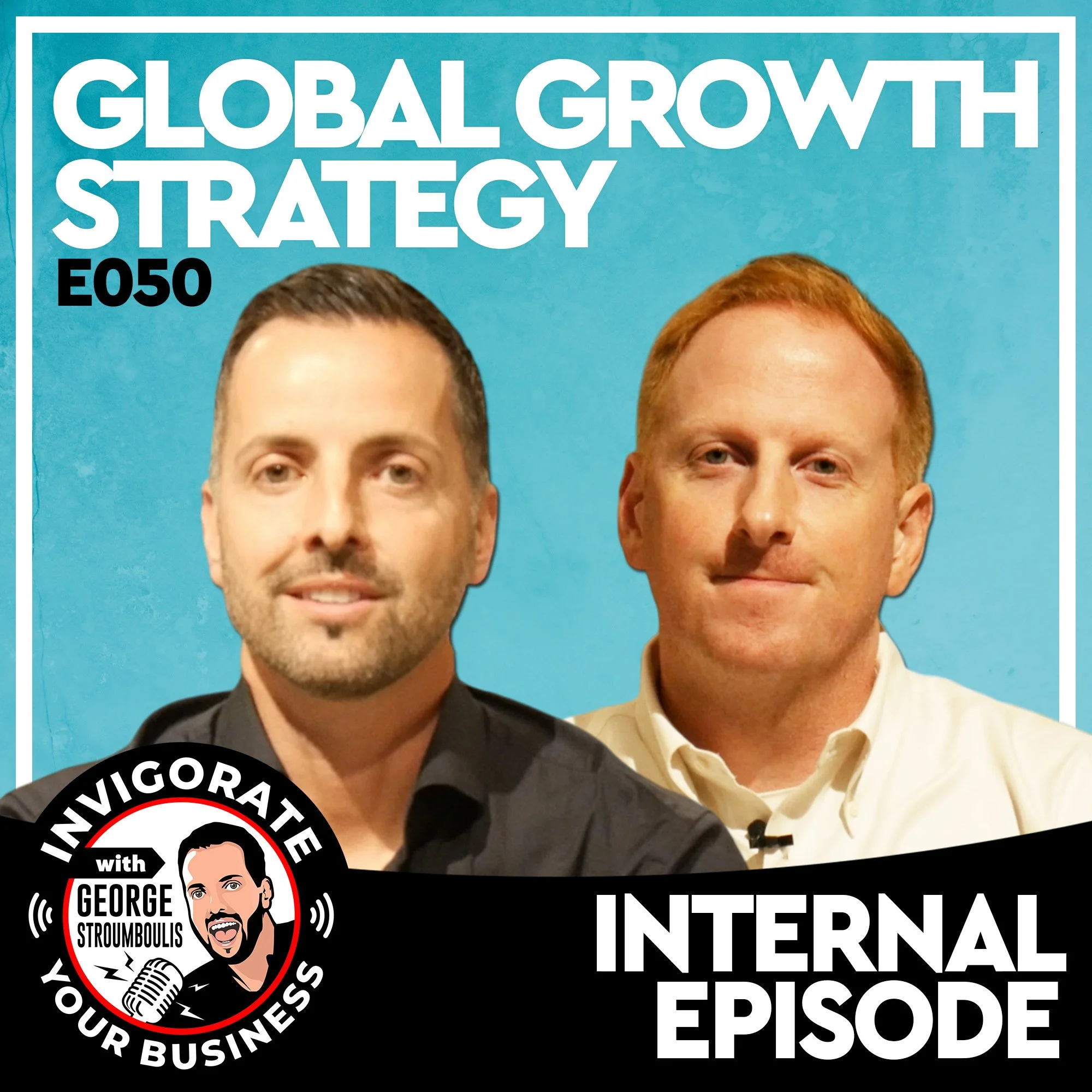
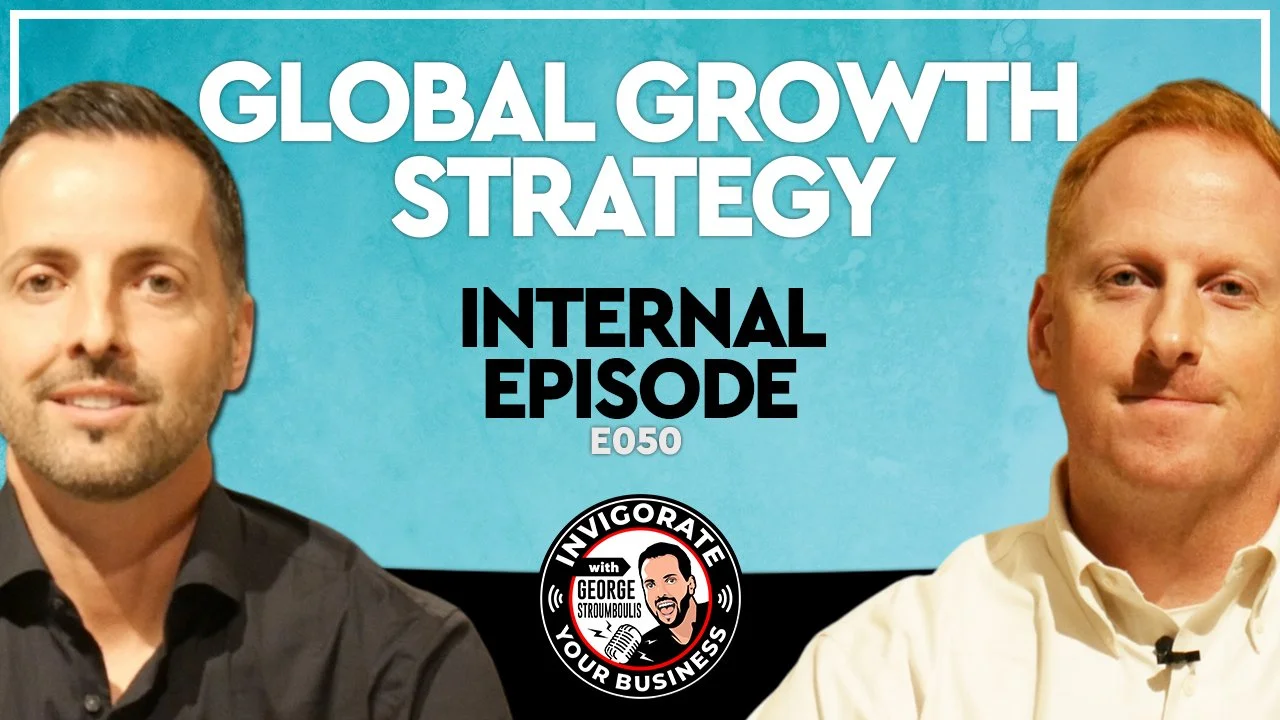
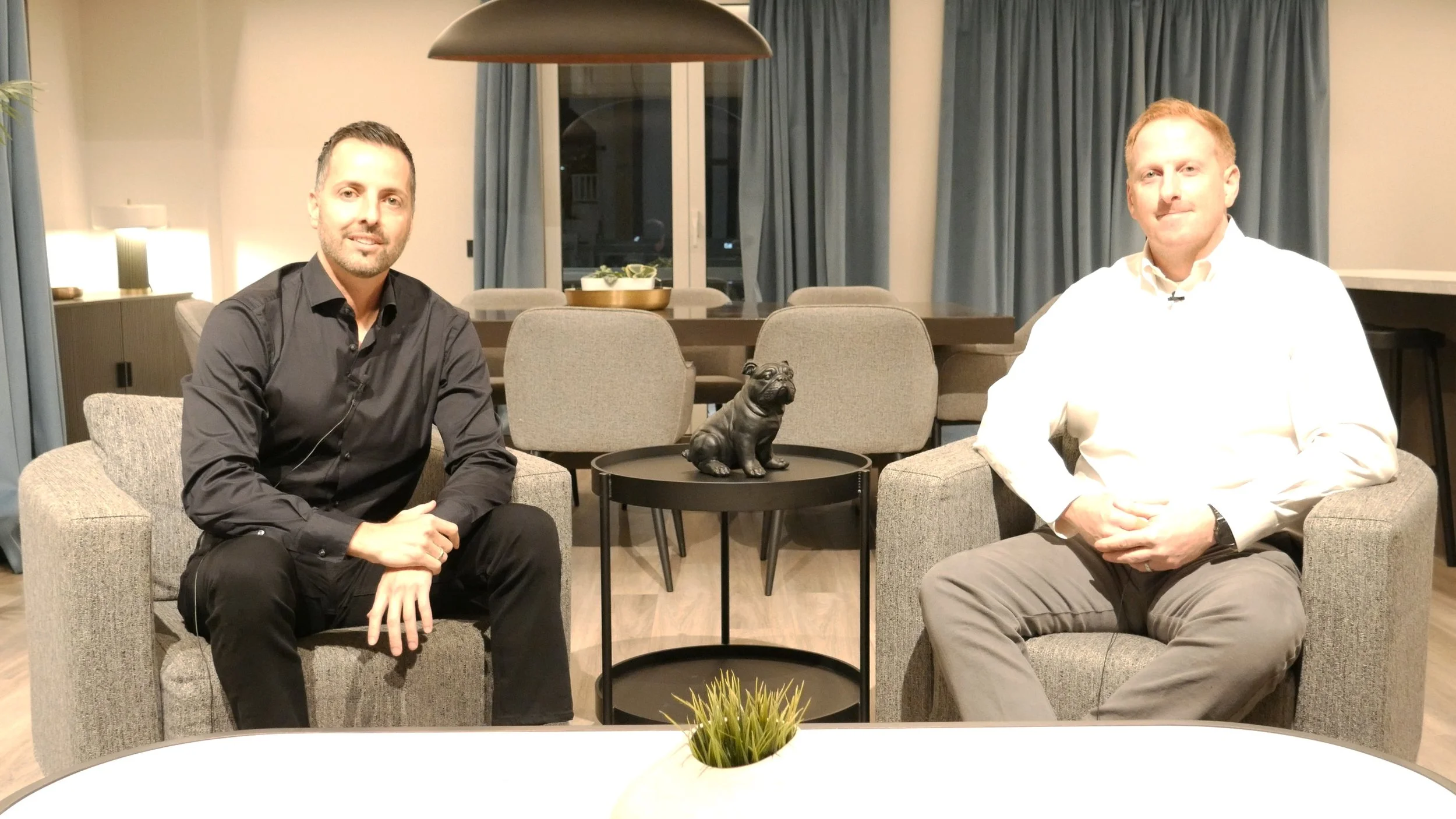
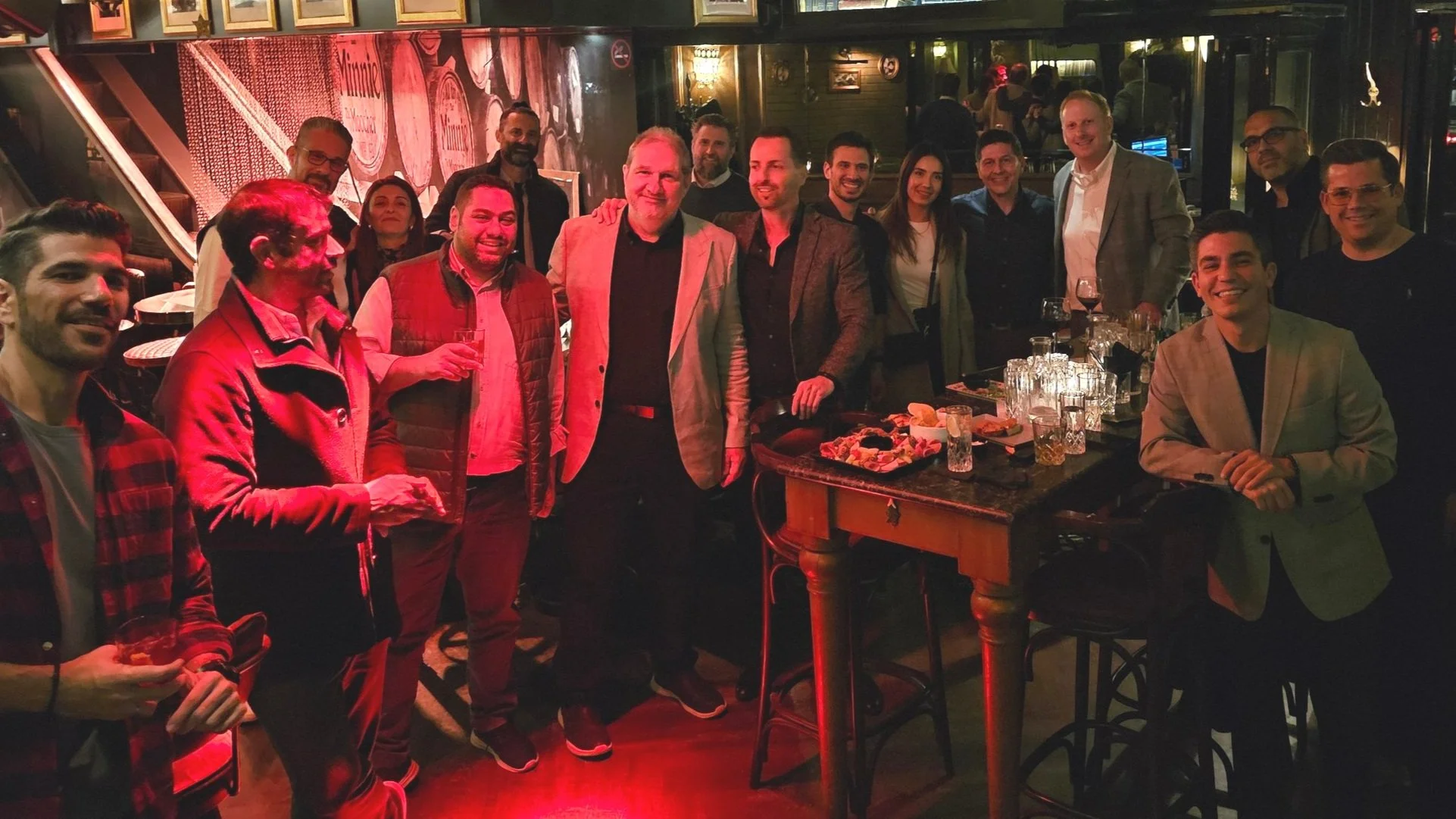
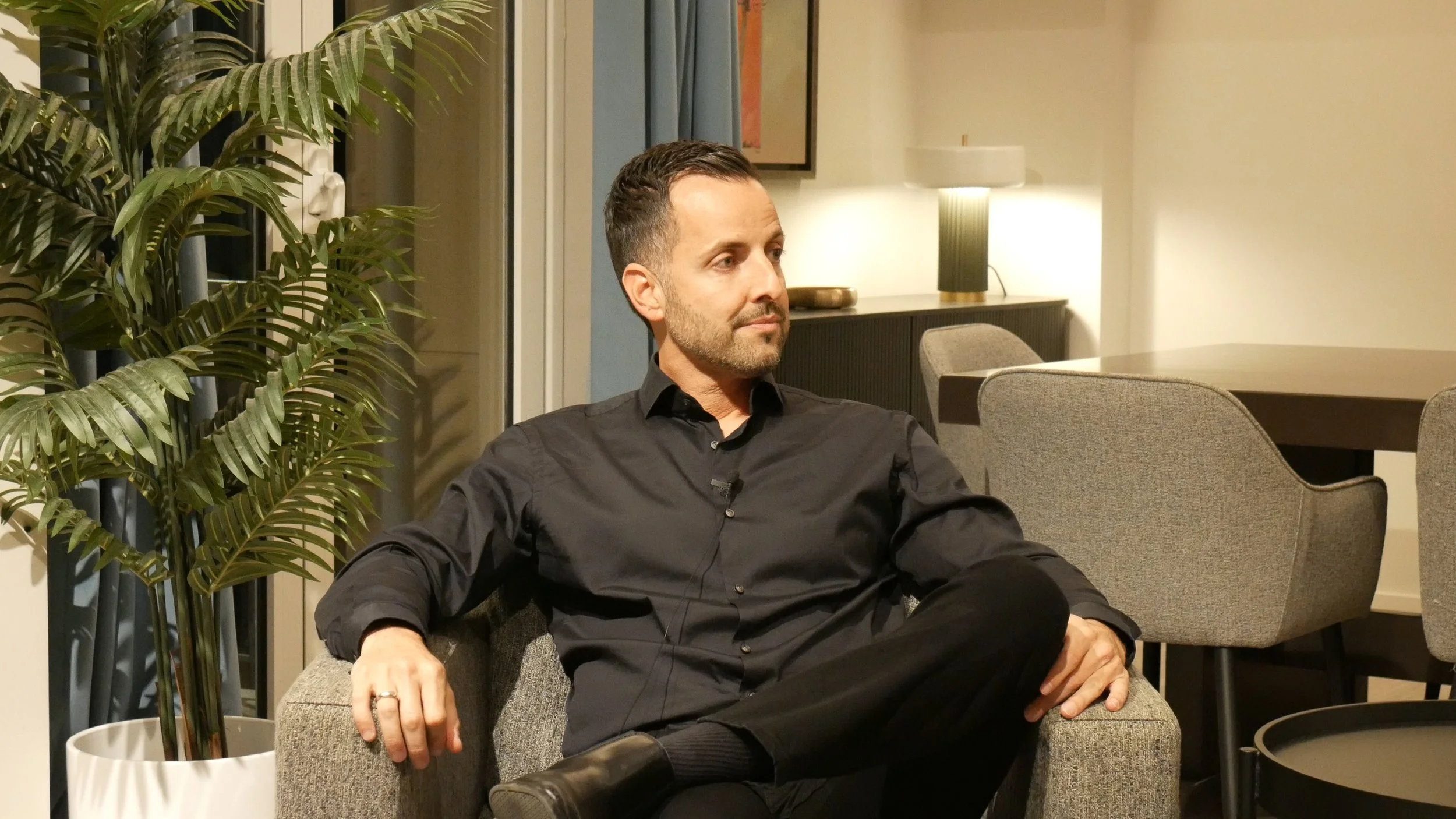
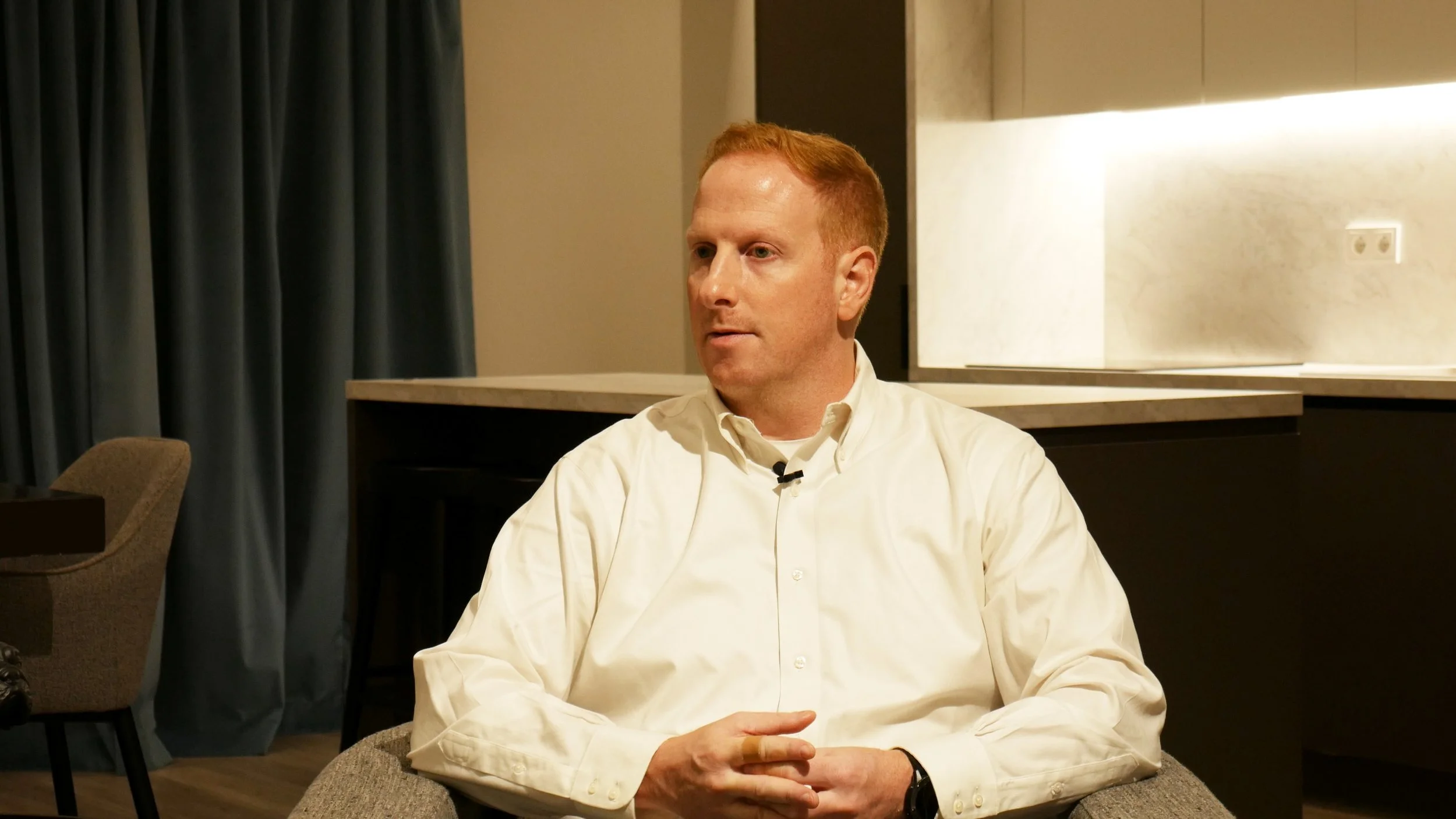
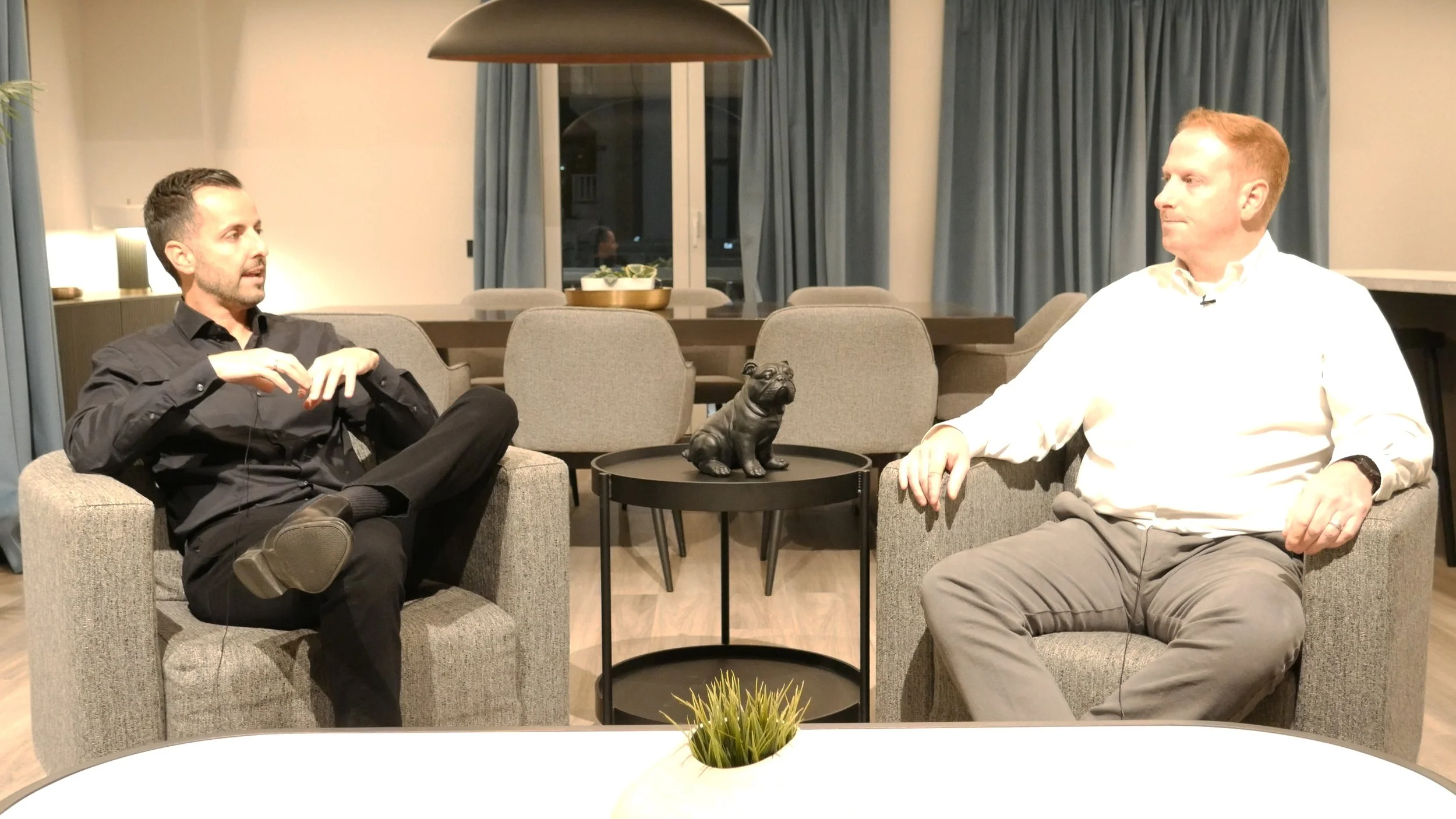
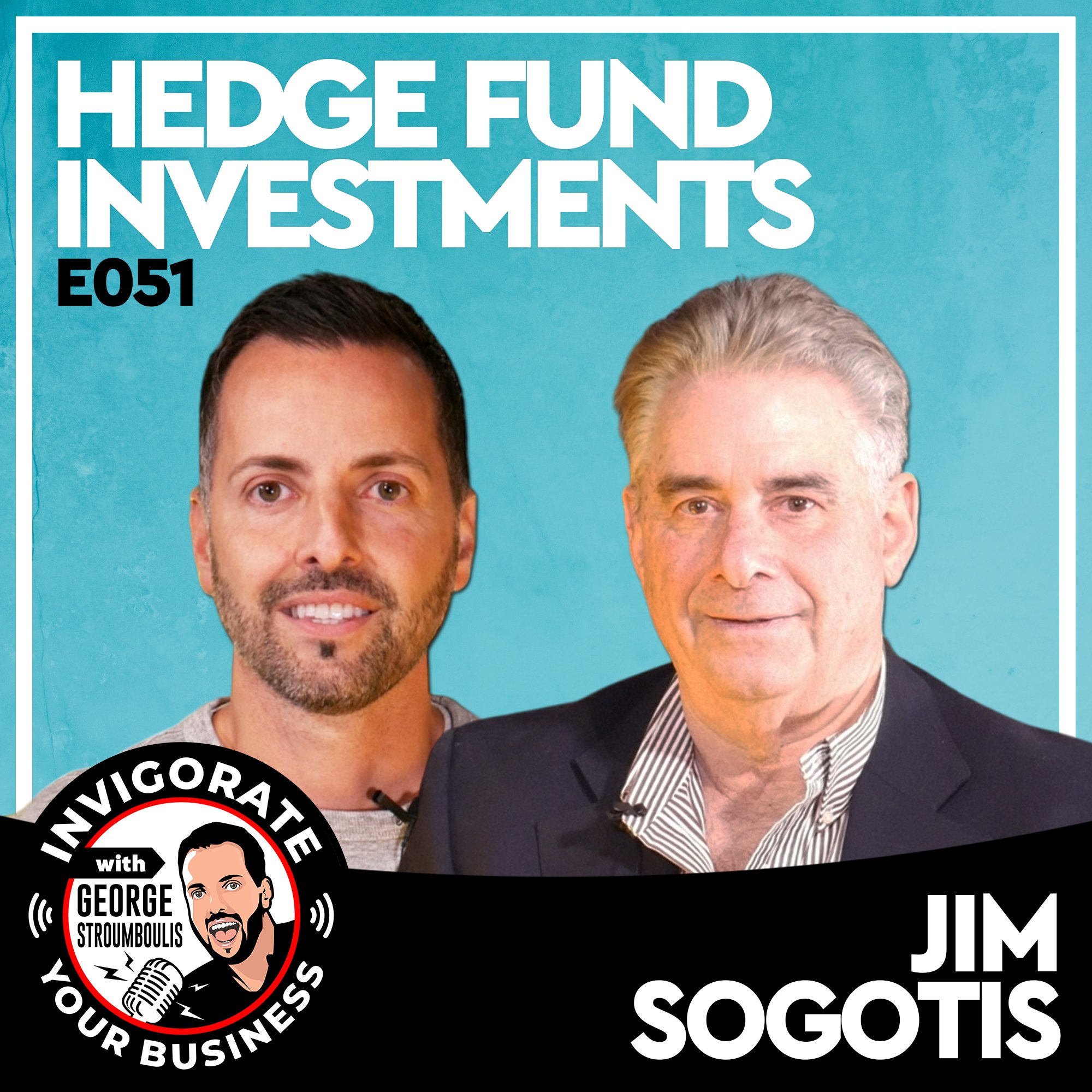



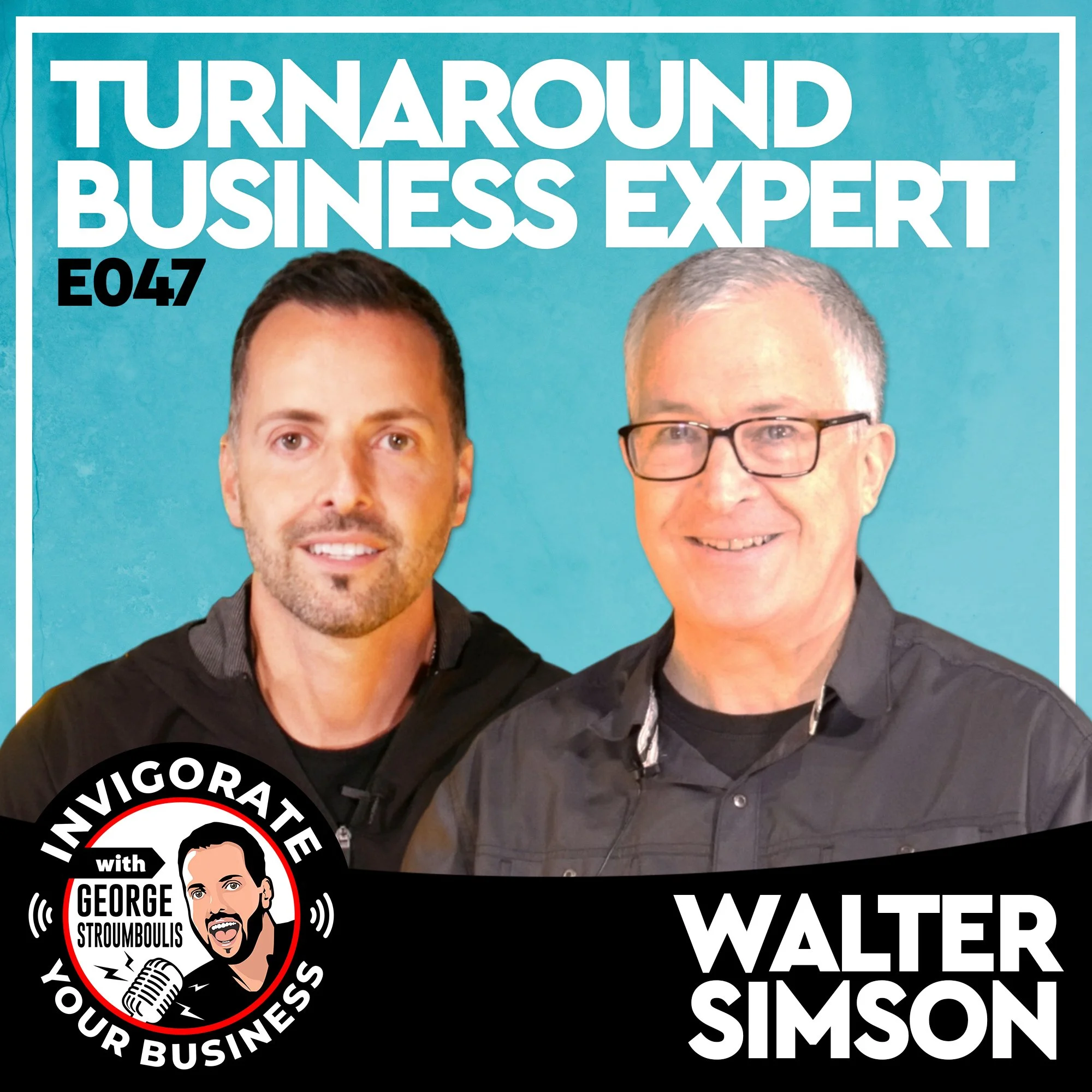
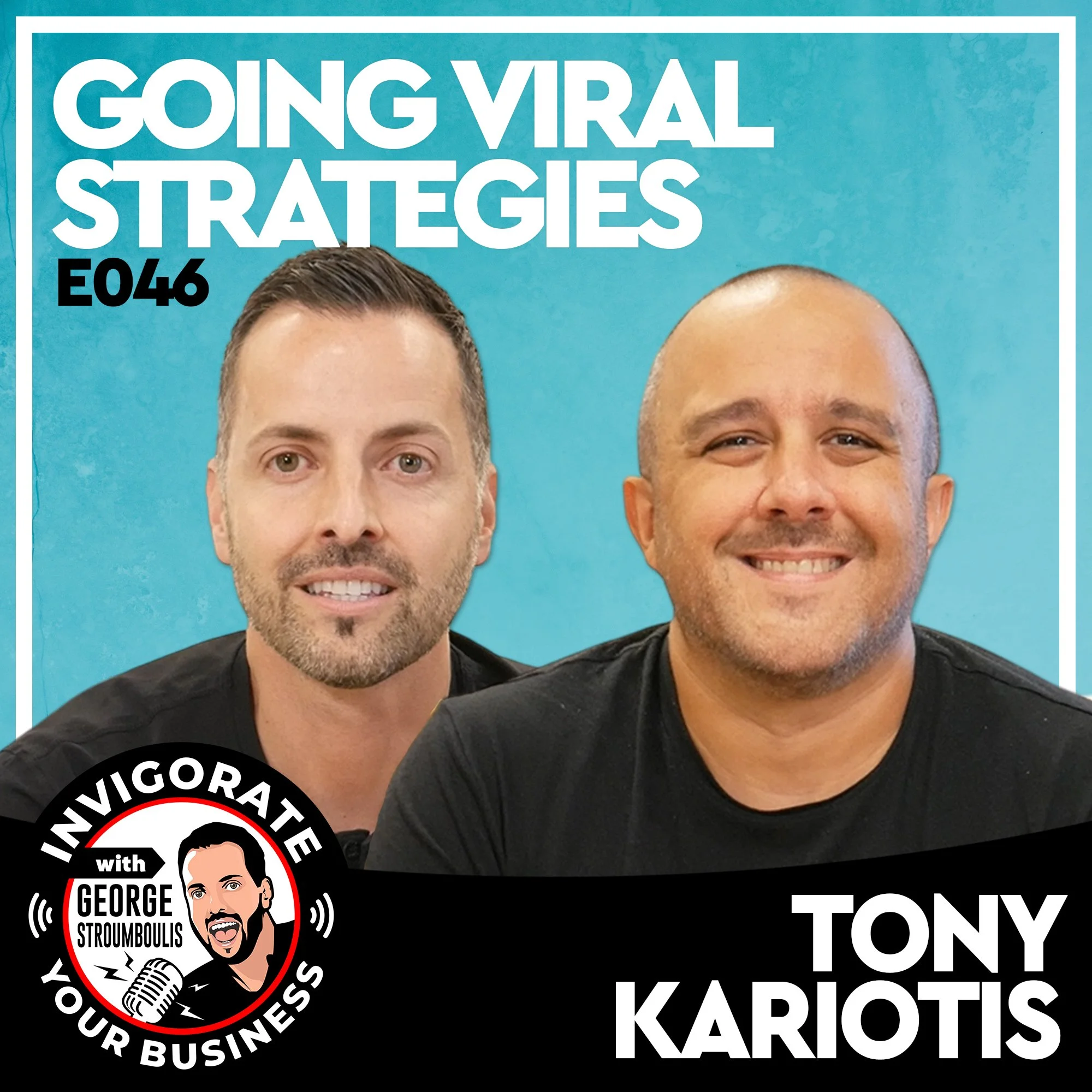

George Stroumboulis sits down with Thanasi Papoulias in Newport Beach, California on the Invigorate Your Business Podcast to talk about all things digital media, social media, influencing, online business strategies, celebrity interactions and so much more.